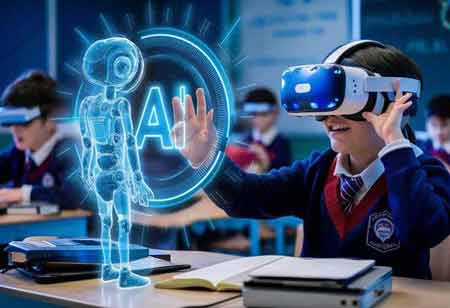THANK YOU FOR SUBSCRIBING
Be first to read the latest tech news, Industry Leader's Insights, and CIO interviews of medium and large enterprises exclusively from Education Technology Insights
The Rise of Hands-On AI Education in Europe
The European education sector is transforming with practical AI skills platforms, emphasising hands-on learning to bridge the gap between theory and industry demands, enhancing workforce competitiveness.

By
Education Technology Insights | Friday, June 27, 2025
Stay ahead of the industry with exclusive feature stories on the top companies, expert insights and the latest news delivered straight to your inbox. Subscribe today.
The European education technology sector is undergoing a profound transformation, primarily driven by the increasing integration of practical AI skills platforms. This evolution signifies a pivotal shift from purely theoretical AI knowledge to the cultivation of demonstrable, applicable competencies, essential for navigating and innovating within an increasingly AI-driven global economy. Europe's strategic emphasis on fostering a workforce adept in practical AI is not merely about technological adoption; it's about securing future competitiveness, driving economic growth, and ensuring a human-centric approach to AI development across various industries.
The Core of Practical AI Education
At the heart of this transformative trend are platforms designed to deliver hands-on, experiential learning in artificial intelligence. These practical AI skills platforms go beyond conventional classroom settings by providing immersive environments where learners can directly engage with AI tools, frameworks, and real-world datasets. The core philosophy is rooted in "learning by doing," enabling users to not only grasp the conceptual underpinnings of AI but also to develop, deploy, and refine AI models and applications. This practical orientation is crucial for equipping individuals with the confidence and tangible capabilities required to excel in professional AI roles. Such platforms often simulate industry-standard workflows, exposing learners to the authentic challenges and solutions encountered in the field, thereby bridging the notorious gap between academic learning and industry readiness.
The pedagogical methodologies employed by these platforms are characterised by their innovation and adaptability. A prominent feature is the utilisation of adaptive learning pathways, where AI algorithms personalise the educational journey for each learner. By analysing individual progress, learning styles, and knowledge gaps, these systems dynamically adjust content delivery, recommend tailored exercises, and provide bespoke feedback. This personalised approach optimises learning efficiency and ensures that every student progresses at an optimal pace, focusing on areas where they require the most support. Intelligent tutoring systems augment this personalised learning experience, offering on-demand, often conversational, guidance and assistance. These AI-powered tutors help learners navigate complex AI concepts, troubleshoot coding issues, and develop problem-solving strategies, mimicking the support a human instructor might provide but with greater scalability and accessibility. Furthermore, project-based learning is a foundational element that compels learners to tackle real-world AI problems, fostering critical thinking, collaborative skills, and innovative solutions. This active engagement cultivates a deeper understanding and practical mastery of AI principles, moving beyond rote memorisation to genuine application.
Expanding the AI Skillset
The scope of content covered by these practical AI skills platforms is extensive and continually expanding, reflecting the rapid advancements in the AI domain. Learners are exposed to foundational concepts in machine learning, encompassing a broad spectrum of algorithms, data preprocessing techniques, model training, and rigorous evaluation methodologies. Specialised tracks delve into areas such as natural language processing, enabling the development of applications that can interpret, generate, and interact with human language. Computer vision modules equip individuals with the expertise to process and analyse visual data for applications ranging from image recognition to autonomous navigation. Robotics, data science, and the burgeoning field of generative AI are also increasingly integrated into curricula, ensuring comprehensive training that aligns with the cutting edge of AI innovation. The dynamic nature of these curricula is a key strength, allowing platforms to swiftly incorporate new research, tools, and industry demands, thereby ensuring that learners are always equipped with the most relevant and forward-looking skills.
Impact on European Education and Future Trajectory
The influence of these practical AI skills platforms on European higher education is transformative. They are instrumental in addressing the burgeoning demand for AI-competent professionals, effectively bridging the chasm between theoretical academic knowledge and the practical competencies required by the industry. Universities, polytechnics, and vocational training institutions across Europe are increasingly embedding these platforms into their educational programs. This integration often manifests as blended learning models, combining traditional lectures and seminars with intensive hands-on sessions in virtual labs and collaborative project environments. Such collaborations enhance the practical relevance of academic courses, making graduates more attractive to employers and significantly boosting their employability in the AI sector. This symbiotic relationship between educational institutions and practical AI platforms is fostering a new paradigm of skills development, where theoretical understanding is immediately reinforced through practical application. However, the full potential of this transformation can only be realised with the support and strategic planning of policymakers, who play a crucial role in ensuring the widespread adoption and effective implementation of these platforms in the European education system.
The future of practical AI skills development in European education technology is poised for further innovation and deeper integration. There will be an intensified focus on interdisciplinary learning, recognising that impactful AI solutions often necessitate insights and collaboration across diverse fields such as ethics, law, social sciences, and various industry domains. The emphasis will remain firmly on fostering not just technical proficiency but also crucial soft skills such as creativity, ethical reasoning, collaborative problem-solving, and adaptability. However, it's essential to acknowledge that with the growing integration of AI into various aspects of human lives, there are potential challenges and ethical considerations that must be addressed. This holistic approach ensures that learners are not merely proficient in current AI technologies but are also capable of critically assessing, ethically developing, and creatively applying AI in unforeseen future contexts. As AI continues to pervade all facets of society, the imperative for individuals equipped with practical AI skills will only escalate, cementing the role of these platforms as indispensable pillars of Europe's educational infrastructure. Their continuous advancement will be paramount in nurturing a workforce that can fully harness the transformative potential of AI for sustained economic prosperity and societal advancement across the continent.







